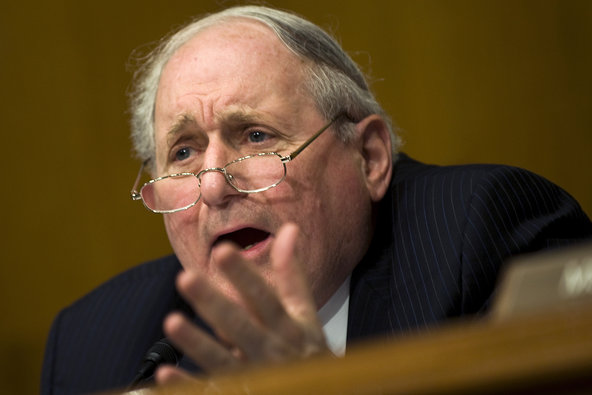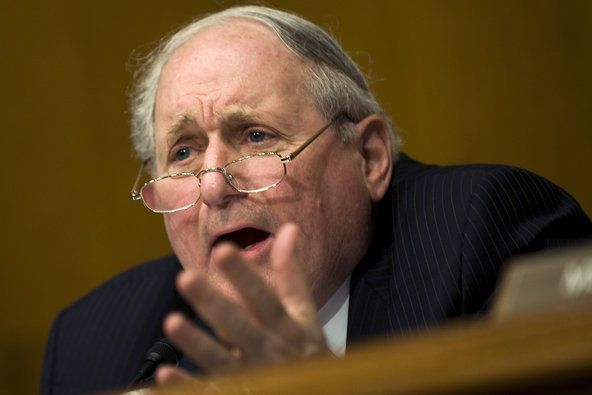 Jim Watson/Agence France-Presse — Getty ImagesSenator Carl Levin has criticized what he called questionable conduct by Goldman and other banks.
Jim Watson/Agence France-Presse — Getty ImagesSenator Carl Levin has criticized what he called questionable conduct by Goldman and other banks.
WASHINGTON — After deciding not to prosecute Goldman Sachs for its conduct during the financial crisis, the Justice Department did something rare: it publicly announced that the investigation was closed.
The unusual public announcement came after Goldman’s lawyers pushed for a notification that the bank would not be charged, according to two people with direct knowledge of the matter who spoke on condition of anonymity.
In a 450-word statement issued late Thursday, authorities said that “based on the law and evidence as they exist at this time, there is not a viable basis to bring a criminal prosecution.”
Many legal experts agree it would have been hard to bring charges. But the public announcement also raised eyebrows because under most circumstances criminal inquiries are shrouded in secrecy. When the Justice Department decides to end a criminal inquiry without prosecuting, it usually does not disclose that decision to the public — or even to the target of the investigation.
The Justice Department’s decision rankled Wall Street critics who want banks to pay for their actions. On Friday, the senator that had requested the criminal investigation denounced Goldman.
“Whether the decision by the Department of Justice is the product of weak laws or weak enforcement, Goldman Sachs” actions were deceptive and immoral,” Senator Carl Levin, a Michigan Democrat, said in a statement.
By closing its case, the Justice Department has removed the taint of a possible indictment against Goldman, which had already paid $550 million to settle a related civil matter brought by the Securities and Exchange Commission. “We believe that the Justice Department’s examination has been thorough and impartial,” said Andrew Williams, a Goldman Sachs spokesman.
Federal prosecutors began investigating Goldman more than a year ago after the Senate’s Permanent Subcommittee on Investigations issued a blistering report highlighting questionable conduct by Goldman and other banks. It focused on Goldman’s lucrative business of selling pools of subprime mortgage securities to clients while simultaneously betting on a decline in the housing market. In effect, the report concluded that Goldman had profited by betting against the very mortgage investments that it sold to clients.
It also suggested that Lloyd C. Blankfein, the chief executive of Goldman, might have misled lawmakers when testifying about the mortgage deals. Mr. Blankfein said that the bank never bet against its clients for its own profit.
As part of the report, Mr. Levin, the chairman of the subcommittee, referred Goldman’s case to the Justice Department for a criminal investigation in April 2011. But after investigating Goldman for more than a year, the Justice Department decided not to bring a case.
“The department and its investigative partners conducted an exhaustive review of the report and its exhibits, independently gathered and scrutinized a large volume of other documents, and tenaciously pursued potential evidentiary leads, including conducting numerous witness interviews,” the Justice Department said in its statement.
Separately, Goldman also disclosed on Thursday that the S.E.C. would not pursue any further claims against the bank related to the sale of a $1.3 billion mortgage bond deal.
On Friday, legal experts said that it was always unlikely that the government would bring a criminal prosecution against Goldman Sachs.
Ever since the 2002 indictment of Arthur Andersen caused the accounting giant to collapse and caused thousands of job losses, the government has been reluctant to bring charges against a company.
Instead, companies are now frequently offered so-called deferred prosecution agreements in which they pay a fine and agree to government oversight instead of facing criminal prosecution.
“The likelihood of the Justice Department indicting a ‘too big to fail bank’ like Goldman Sachs was always slim-to-none,” said Stephen M. Plotnick, a securities lawyer at Carter Ledyard Milburn. “And a major hurdle in a criminal prosecution of Goldman’s executives was proving that they intended to defraud their clients.”
While the decision not to charge Goldman was not surprising, the uncommon public announcement by the Justice Department raised eyebrows. Because it is illegal to disclose the existence of a grand jury investigation, under most circumstances criminal inquiries are shrouded in secrecy. And when the Justice Department decides to end a criminal inquiry without prosecuting, it usually does not disclose that decision to the public — or even to the target of the investigation.
The Goldman case, however, fit within an exception to these secrecy rules because of the immense publicity surrounding the investigation of the bank. Justice Department lawyers are permitted to comment on investigations that have leaked to the public or received substantial media attention, according to department guidelines.
For instance, in another case involving a bank, the Justice Department announced in August 2011 that it had closed a criminal investigation of Washington Mutual and its former executives connected to its collapse during the financial crisis.
The Justice Department has also announced that it was not bringing criminal charges in several leaked investigations of prominent politicians, including the former New York governor Eliot Spitzer and the former New Jersey senator Robert Torricelli. Earlier this year, federal prosecutors in Los Angeles announced that they had closed their investigation of Lance Armstrong without charging him, nearly two years after they began looking into accusations that he and his bicycling teammates had committed a variety of possible crimes by doping.
“Leaked investigations are like storm clouds that hang over companies and individuals, making it incredibly difficult for businesses to run or for people to live out their lives,” said Boyd M. Johnson III, a partner at WilmerHale and a former federal prosecutor. “The Department of Justice has a responsibility to seriously consider issuing public statements of declination where investigations have leaked. It is a matter of fundamental fairness.”
While it no longer faces the prospect of criminal charges, Goldman has absorbed substantial damage to its reputation from Abacus, the complex subprime mortgage product that it sold to clients. And even though it settled with the S.E.C., a midlevel employee in the bank’s mortgage unit, Fabrice Tourre, still faces a civil trial related to the Abacus transaction. Its public image has also taken a hit from unflattering portrayals in the media, including its depiction as a “vampire squid” in a Rolling Stone article.
On Friday, Mr. Levin said that the Justice Department’s decision only highlighted the need for stiffer regulations for Wall Street banks under the new Dodd-Frank financial reform laws.
“Yesterday’s announcement makes it even more important that regulators implement Dodd-Frank with rules that do not water it down, and that they enforce those rules with vigor,” he said. “The integrity of our financial markets and the strength of our economy demand that we make sure that actions such as Goldman Sachs’s and other recently discovered misdeeds by financial institutions are ended.”
A version of this article appeared in print on 08/11/2012, on page B1 of the NewYork edition with the headline: U.S. Goldman Disclosure A Rare Break in Secrecy.
Article source: http://dealbook.nytimes.com/2012/08/10/justice-department-closes-investigation-of-goldman/?partner=rss&emc=rss
